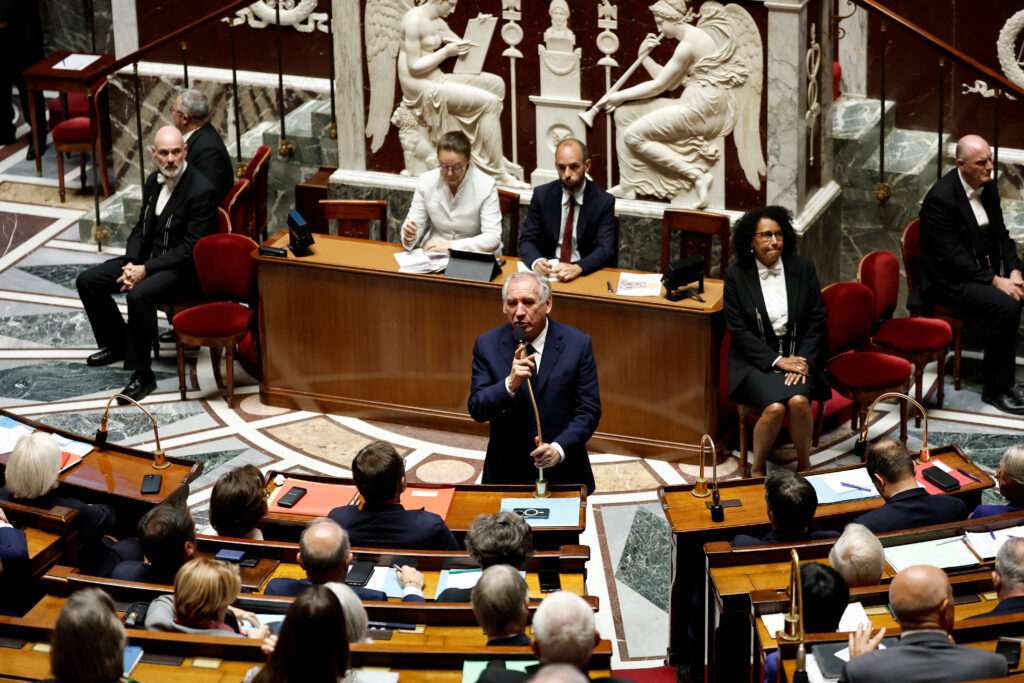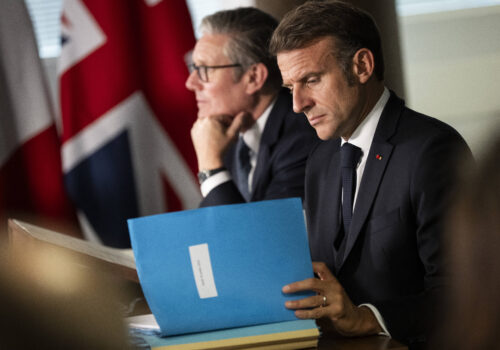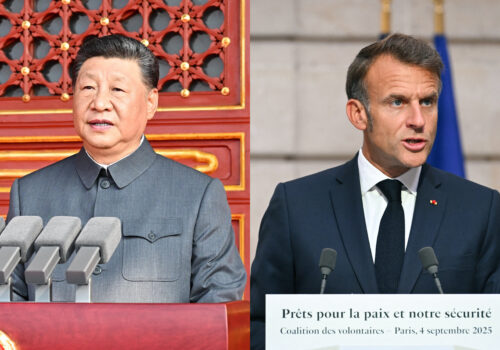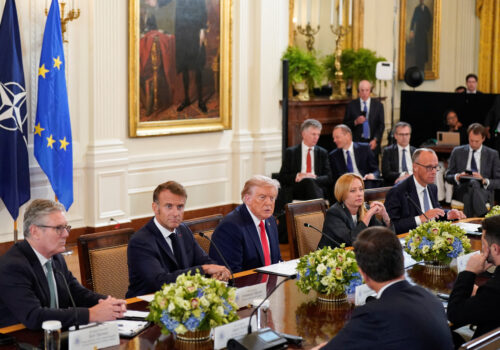Early September is known in France as La Rentrée, when children go back to school and adults return to work after the summer holiday. This year the French are returning to yet another political crisis, too. On Monday, Prime Minister François Bayrou lost a confidence vote in the National Assembly in Paris, triggering his ouster. Later this week, President Emmanuel Macron is expected to appoint a new prime minister—the fifth in two years. Bayrou had called for Monday’s vote to build momentum for his plans to rein in government deficits with spending cuts and tax increases. Those efforts are now paused, and the political uncertainty to follow could ripple across the continent and beyond. Below, Atlantic Council experts shed light on what’s happening in the City of Light.
Click to jump to an expert analysis:
Jörn Fleck: France’s political instability will be felt in Brussels and Berlin, too
Lisa Homel: Facing constraints at home, Macron is likely to focus even more on foreign policy
Rama Yade: Macron’s best bet may be a prime minister from the opposition
Bayrou’s failed plan to cut spending reveals a political division between the old and young
Bayrou will resign after losing a vote of confidence that he himself had called. He knew he would lose but decided to preempt a parliamentary budget process that was also doomed to end in failure and probably end his premiership as well. After all, this is what happened to his predecessor Michel Barnier less than a year ago.
Bayrou has not tried to obfuscate the fact that French deficit spending is unsustainable. His draft budget included forty billion euros of savings and other measures that were meant to set France on course to bring its annual deficit under 3 percent of gross domestic product (GDP)—the point at which, with growth and inflation, the debt-to-GDP ratio stops increasing—by 2029. The idea of eliminating two public holidays with no wage increases was particularly unpopular.
Less deserving of praise has been Bayrou’s reluctance to build any kind of consensus with other parties over the summer. At the helm of a minority government, this was compulsory. Still, since Bayrou called the vote of confidence that would seal his fate two weeks ago, his frankness on the French social model has been very refreshing. Politicians like Bayrou who belong to France’s shrinking political center rely on the votes of the retired to stay in office. Along with demographics, this explains how ever more resources have been diverted to funding generous pensions—often to the direct detriment of vital public services like education, policing, and defense.
At seventy-four years old, Bayrou has suddenly become an unlikely champion of younger voters who do not benefit from such largesse and will have to deal with the debt burden these policies leave behind. He has spent the past two weeks arguing that the system is too skewed toward “Boomers” and must be changed. For this alone, Bayrou deserves credit.
France’s borrowing costs continue to creep up. They are above Greece’s and are closing in on Italy’s. Markets’ eyes are peeled for the next Fitch sovereign rating decision scheduled for September 12. For now, we shouldn’t expect volatility of the kind we experienced during the eurozone periphery crisis. Euro-denominated French debt is still desirable because there isn’t much German debt to go around. It is worth bearing in mind, however, that this is about to change. Berlin’s 2026 budget plans a tripling of borrowing compared to this year’s.
—Charles Lichfield is the deputy director and C. Boyden Gray senior fellow, of the Atlantic Council’s GeoEconomics Center.
France’s political instability will be felt in Brussels and Berlin, too
Monday’s vote of no confidence and the impending resignation of Bayrou will not be welcome news in Brussels and the rest of Europe. The ensuing political instability in France risks distracting, if not detracting from Macron’s undoubted leadership in building meaningful European commitments to security guarantees and a reassurance force for Ukraine, which could help keep US President Donald Trump engaged in pressing Russia on a peace deal.
When it comes to European defense, those in Brussels who favor more cooperation at the level of the European Union (EU) will have a weaker ally in Paris as the union seeks to translate its defense-industrial ambitions into actual budgetary commitments and industrial policies. Few, especially in Central and Northern Europe, share France’s concept of strategic autonomy and calls for EU sourcing requirements for the continent’s rearmament. But France has had an important political role in pushing EU-level coordination and cooperation against those who instead prefer the EU institutions to simply get out of the way of member states that want to prioritize short-term off-the-shelf solutions, primarily from US defense companies. Short-term Schadenfreude from the strategic autonomy critics may come at the expense of European industrial capacity in the medium to long term without French political initiatives at the EU level. All of this will be compounded by the likely fallout for French credibility from the likely delays in making its pledges for defense spending increases for the coming years a legislative reality, as happened when the Barnier government fell.
Berlin especially will be concerned. With some success, Chancellor Friedrich Merz and his new government had invested significantly in bringing back the Franco-German relationship from some of its most difficult days under Chancellor Olaf Scholz. While parliamentary instability will not directly impact Macron’s primacy over foreign and defense policy, the political maneuvering ahead of the 2027 presidential elections in France is likely to get even more intense. That will reduce the policy space for the next French government when it comes to important decisions for the EU’s economic outlook: within France on unavoidable reforms to improve the fiscal position of the EU’s second-largest economy, and in Brussels when it comes to Europe’s trade, tech, and other policies critical to a much-needed push for regulatory simplification and economic diversification amid growing pressures from the United States and China.
—Jörn Fleck is the senior director of the Atlantic Council’s Europe Center.
Facing constraints at home, Macron is likely to focus even more on foreign policy
With the French parliament voting to oust its second prime minister in a year, Macron is beset by chaos and ineffectiveness at home even as he has strived to be the figurehead for leadership and European unity abroad. Just last week, the French president co-hosted the Coalition of the Willing meeting in Paris, where twenty-six nations committed to providing postwar security guarantees to Ukraine.
Bayrou is the third centrist leader out of a job since Macron called snap elections in June 2024 in a failed attempt to solidify his mandate after the far right’s surprising performance in European Parliament elections. However, the resulting hung parliament has no working majority and has only increased the political fragmentation in France. This latest political crisis stems from the government’s inability to pass a budget that would have seen a €44 billion cut in an effort to reduce France’s budget deficit (which stands at 5.8 percent of GDP, nearly double the EU standard of 3 percent).
Still, despite Macron’s increasing unpopularity at home, with two years left in his last presidential term, he is unlikely to resign. Expect Macron to instead maintain his focus on the international arena where he can still drive his agenda forward: rallying dramatic international support for Ukraine through the Coalition of the Willing, using the 2025 United Nations General Assembly to recognize a state of Palestine, deepening ties with Southeast Asian partners, and joining the United Kingdom and Germany in reimposing snapback sanctions on Iran.
But with France’s budget under the microscope, these efforts may be more about capabilities and building international consensus rather than increasing spending.
—Lisa Homel is an associate director of the Atlantic Council’s Europe Center where she supports the center’s work on France, Germany, the Western Balkans, and Central and Eastern Europe.
Macron’s best bet may be a prime minister from the opposition
Macron’s number one problem is not the choice of a prime minister. There will always be candidates from all parties for this position, no matter how precarious the job may be. The challenge for Macron lies in his difficulty in embracing the policy that the French people want, i.e., a different policy than the one he has led for the past eight years. As long as he chooses prime ministers from the right-wing opposition (Les Républicains), his party (Renaissance), or the center-left opposition (the Socialist Party), they will remain in the minority. Furthermore, as they are all from the same backgrounds and share the same ideas, nothing will fundamentally change in the eyes of the French people.
With the fall of Bayrou’s government, Macron is now directly exposed to their anger: No prime minister, except a prime minister in a cohabitation government, can protect him. This has led to increased debate about his resignation as the only possible solution, paving the way for a democratic reset. Since he refuses to resign, only a prime minister from the opposition would allow him to respect the July 2024 vote and perhaps save himself, like former President François Mitterrand did in his first cohabitation in 1986. Mitterrand, with the help of the institutions and his subtle political Machiavellianism, managed to stay in the game against his prime minister at the time, Jacques Chirac.
Even if pressure is high on Macron to choose a prime minister from the far right, French voters have consistently opposed the Republican Front to Marine Le Pen’s party, National Rally. Given the nature of the French institutions, it would make more sense to designate an opposition prime minister from the New Popular Front, the winner of the 2024 elections in the wake of the dissolution of the parliament. If Macron walks away from this option, it is uncertain whether France, tossed between dissolutions and prime ministerial resignations, will be able to endure for two years until the next presidential election in 2027.
Further reading
Wed, Jul 16, 2025
Reading between the lines of the new France-UK nuclear entente
New Atlanticist By Léonie Allard
French President Emmanuel Macron and British Prime Minister Kier Starmer released a “truly historic” declaration on nuclear planning on July 10.
Thu, Sep 4, 2025
In Beijing and Paris, a tale of two global futures
Inflection Points By Frederick Kempe
Recent gatherings in China and France revealed that competing international orders are crystallizing. What part will the United States play?
Tue, Aug 19, 2025
Europe needs to keep up the momentum for Ukraine after its White House show of force
New Atlanticist By Jörn Fleck, James Batchik
Among other steps, European leaders should press forward on defining what security guarantees for Ukraine look like.
Image: French Prime Minister Francois Bayrou speaks during a debate before a confidence vote on the budget issue during an extraordinary session at the National Assembly in Paris, France, September 8, 2025. REUTERS/Benoit Tessier



